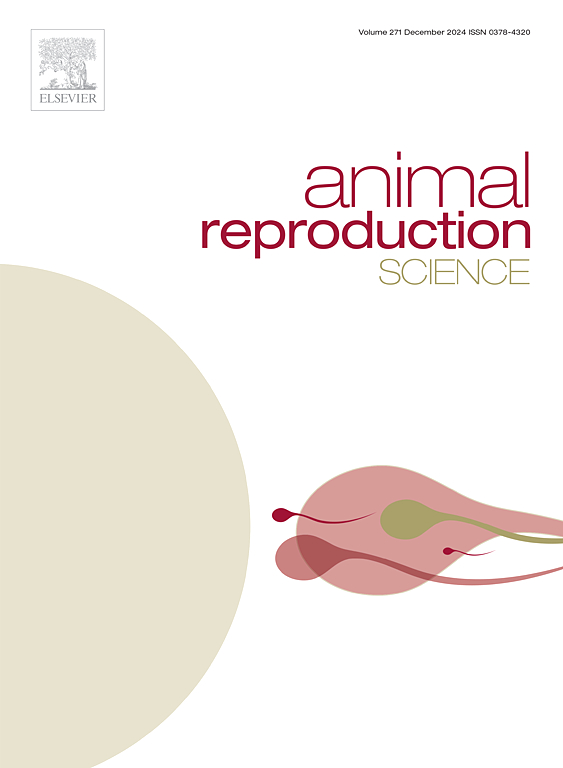Pigs in heaven: Enhancing the lives of breeding boars
IF 3.3
2区 农林科学
Q1 AGRICULTURE, DAIRY & ANIMAL SCIENCE
引用次数: 0
Abstract
The recognition of animals as sentient beings has raised societal awareness of the welfare of farmed animals. This has been instrumental in increasing the legislative pressure towards welfare-conscious farming practices and, more lately, greater consumer demand for ethically sourced products. Besides, improved animal welfare is a key driver for enhanced performance, particularly in breeding boars, as welfare conditions strongly influence reproductive outcomes. The stressors associated with confinement impact testicular physiology and semen quality and the efforts to improve the welfare of breeding boars have so far focused on mitigating the negative consequences associated with stressors. The Five Freedoms framework and the European Food Safety Authority (EFSA)’s ‘welfare consequences’ approach prioritise the alleviation of suffering. In breeding boars, key welfare negative consequences include movement restriction, isolation stress, inability to engage in exploratory behaviours, locomotory disorders, and prolonged hunger. The negative consequences, which can be mitigated by improved housing and management practices, should be tackled in any commitment to improve the welfare of breeding boars. Animal welfare science, however, has recently shifted towards cultivating positive welfare experiences and a life worth living, beyond just alleviating suffering. The Five Domain Model systematically evaluates animal welfare, considering both negative and positive aspects. Encouraging positive welfare states involves facilitating species-specific behaviours, such as exploration and play, and fostering positive human-animal interactions. In breeding boars, strategies promoting positive welfare include providing enriching environments, encouraging exploration, and cultivating positive interactions with caretakers. Thus, for an overall welfare improvement of breeding boars, not only should the absence of suffering be guaranteed, but also the promotion of positive experiences that make their lifes worth living.
天堂里的猪改善种公猪的生活。
承认动物是有知觉的生命,提高了社会对养殖动物福利的认识。这有助于增加立法压力,促使人们采取注重福利的养殖方式,最近,消费者对道德产品的需求也在增加。此外,改善动物福利是提高动物生产性能的关键因素,尤其是种公猪,因为福利条件对繁殖结果有很大影响。与圈养相关的应激因素会影响睾丸生理和精液质量,迄今为止,改善种公猪福利的工作主要集中在减轻与应激因素相关的负面影响上。五项自由框架和欧洲食品安全局(EFSA)的 "福利后果 "方法将减轻痛苦放在首位。在种公猪中,主要的福利负面后果包括行动受限、隔离应激、无法进行探索行为、运动失调和长期饥饿。这些负面影响可以通过改善饲养和管理方法来减轻,因此任何改善种公猪福利的措施都应解决这些问题。然而,动物福利科学最近已转向培养积极的福利体验和有价值的生活,而不仅仅是减轻痛苦。五域模型系统地评估了动物福利,同时考虑了消极和积极两个方面。鼓励积极的福利状态包括促进物种特有的行为,如探索和玩耍,以及促进人与动物之间的积极互动。在种公猪中,促进积极福利的策略包括提供丰富的环境、鼓励探索以及培养与看护人的积极互动。因此,要全面改善种公猪的福利,不仅要保证没有痛苦,还要促进积极的体验,使它们的生活更有意义。
本文章由计算机程序翻译,如有差异,请以英文原文为准。
求助全文
约1分钟内获得全文
求助全文
来源期刊

Animal Reproduction Science
农林科学-奶制品与动物科学
CiteScore
4.50
自引率
9.10%
发文量
136
审稿时长
54 days
期刊介绍:
Animal Reproduction Science publishes results from studies relating to reproduction and fertility in animals. This includes both fundamental research and applied studies, including management practices that increase our understanding of the biology and manipulation of reproduction. Manuscripts should go into depth in the mechanisms involved in the research reported, rather than a give a mere description of findings. The focus is on animals that are useful to humans including food- and fibre-producing; companion/recreational; captive; and endangered species including zoo animals, but excluding laboratory animals unless the results of the study provide new information that impacts the basic understanding of the biology or manipulation of reproduction.
The journal''s scope includes the study of reproductive physiology and endocrinology, reproductive cycles, natural and artificial control of reproduction, preservation and use of gametes and embryos, pregnancy and parturition, infertility and sterility, diagnostic and therapeutic techniques.
The Editorial Board of Animal Reproduction Science has decided not to publish papers in which there is an exclusive examination of the in vitro development of oocytes and embryos; however, there will be consideration of papers that include in vitro studies where the source of the oocytes and/or development of the embryos beyond the blastocyst stage is part of the experimental design.
 求助内容:
求助内容: 应助结果提醒方式:
应助结果提醒方式:


